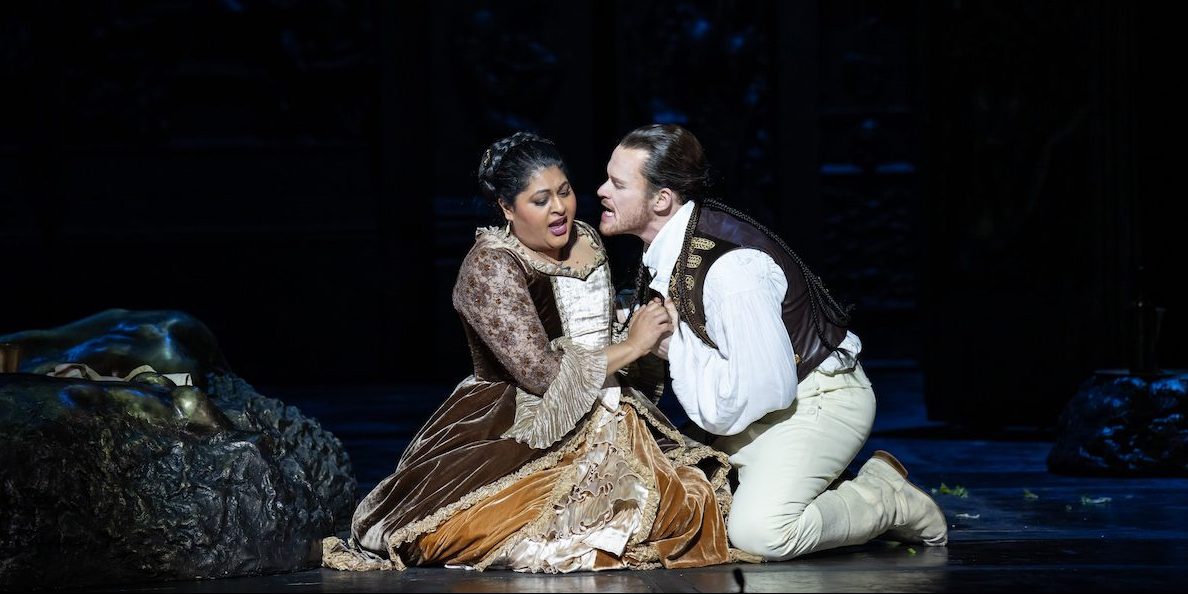This Welsh National Opera production of Don Giovanni has many merits – a fine orchestra, a bold design, some wonderful singing. It offers a convincing version of a story that is difficult to tell in current times. But somehow it fails to reach the heights to which this superb opera can climb when music, drama, performance, and setting are ideally blended.
Don Giovanni, composed in 1787 by Mozart for a first performance in Prague where his merits were more keenly recognised than in the imperial city of Vienna where he lived, tells the tale of the adventures of the notorious seducer Don Giovanni and his servant, Leporello. His insatiable lust – a sex addict might be the popular label for him today – brings him into contact with three women and their menfolk, and though he escapes from a series of risky situations, in the end supernatural forces emerge to force him to confront his crimes against women. He is given a chance to repent but he refuses and he is destroyed.
Charismatic men who exploit women are all too common in our contemporary world – the names of Weinstein, Epstein and Saville spring to mind – and it’s difficult to see why we should feel any sympathy for the Don here. But with Mozart and da Ponte things are never as simple as they seem and the music and the words sometimes seem to contradict each other. The words Viva La Liberta sung by the Don after his shameless exploits can lead to all sorts of dubious dramatic diversions and his behaviour when facing his nemesis can sometimes seem heroic. In this production we are left with no doubts that a bad man has met his deserved end.
The balance between master and servant is often the key to the dramatic power of this opera and here Leporello, played with wit and style by Simon Bailey, seemed more charismatic than his master. As Don Giovanni, Aaron O’Hare sang with a rich warm baritone voice but he didn’t convince as the sexual predator who uses charm and force in equal measure. The night’s big moments were provided by Maria Monzo as a tormented Donna Anna and by the marvellous Sarah Tynan in the difficult role of Donna Elvira. Tynan managed to make the easily-swayed Elvira less of a brainless pushover than is sometimes the case – her beating of Leporello after he has impersonated his master was formidable. James Platt as the Commendatore was impressive and, despite a full face mask, struck the right note of solemnity in the final scene, where his powerful bass voice came to the fore. And as the young lovers whose wedding is wrecked by the Don, James Atkinson and Isabelle Peters combined fine voices with a hint of a transgressive relationship. In the thankless role of Don Ottavio, Donna Anna’s long suffering suitor, Trystan Llyr Griffiths, sang with rich tenor tone and cut a more forceful figure than is often the case.
The Bristol Hippodrome is not a an easy place to present opera – there is no pit and this inevitably means problems balancing the orchestra and the singers. Though they sang with their usual panache, the WNO chorus did not look comfortable as Spanish peasants. The orchestra under conductor, Tobias Ringborg, was less than assured in some of the early passages but came into its own in the final extraordinary scene when the opera buffa heads into horror story territory. The production looked marvellous – movable panels, inspired by Rodin’s ‘Gates of Hell’, glowed like burnished bronze at key moments and provided an apt setting for Don Giovanni’s final torment. This was an enjoyable version of this sublime opera but not one that will live long in the memory.

